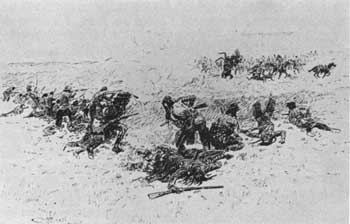





Survey of Historic Sites and Buildings
  |
BEAR PAW MOUNTAINS BATTLEFIELD part of Nez Perce National Historical Park Montana |
 |
| ||
One of the most spectacular retreats and tribal movements in U.S. 182 history and one of the more valiant, though futile, attempts of the Indians to escape the imposition of the white man's civilization on their culture ended at this battlefield. The nontreaty Nez Perces, following the Battle of the Big Hole, Mont., were convinced they would no longer be safe on U.S. soil and finally turned northward to seek sanctuary in Canada. But only 40 miles from the border a column led by Col. Nelson A. Miles, after a swift march from Fort Keogh, Mont., found them camped on Snake Creek in the Bear Paw Mountains and struck on September 30, 1877. Although taken by surprise, the Nez Perces inflicted 20 percent casualties and beat off the assault. Miles then surrounded them, but they held out for 6 days. On October 5 the bulk of the group, or 418 people, surrendered, though some had already escaped to Canada. The day before, General Howard, who had been pursuing the Nez Perces all the way from Idaho, and an advance party of 17 men had arrived—too late to be of much assistance. Miles escorted the captives to Fort Keogh, from where they were sent to Fort Leavenworth, Kans., for confinement and then to a reservation in Indian Territory.
 |
| Charles M. Russell's pen drawing of the Battle of Bear Paw Mountains. (Cowboy Hall of Fame) |
Formerly Bear Paw State Monument (160 acres), the Bear Paw Battlefield is now part of Nez Perce National Historical Park and preserves slightly rolling grasslands where the fighting took place. Two monuments stand in the park. The historic scene has changed little.
NHL Designation: 06/07/88
 |
 |
http://www.cr.nps.gov/history/online_books/soldier-brave/sitea16.htm
Last Updated: 19-Aug-2005